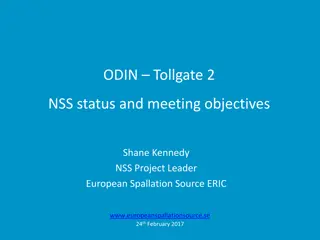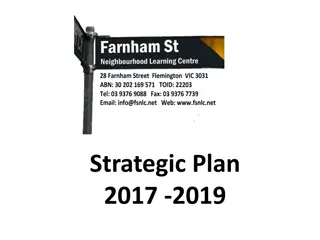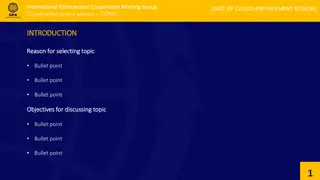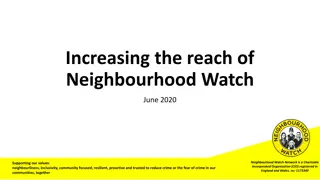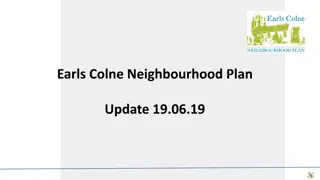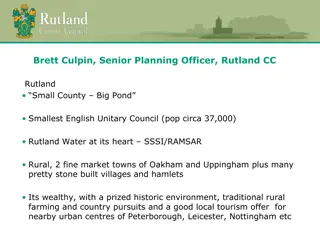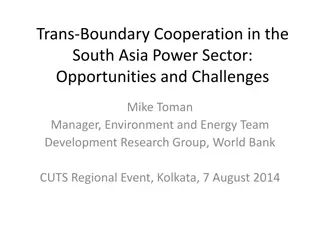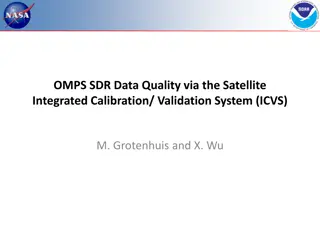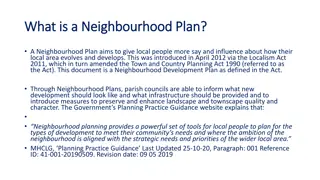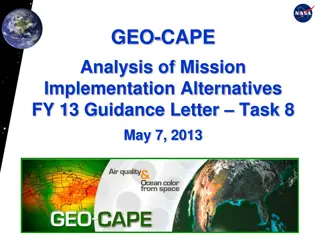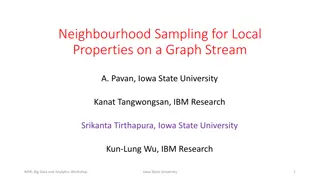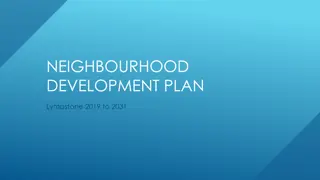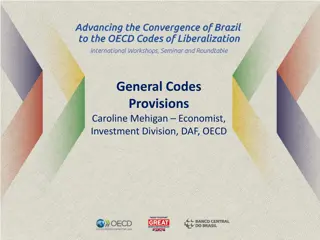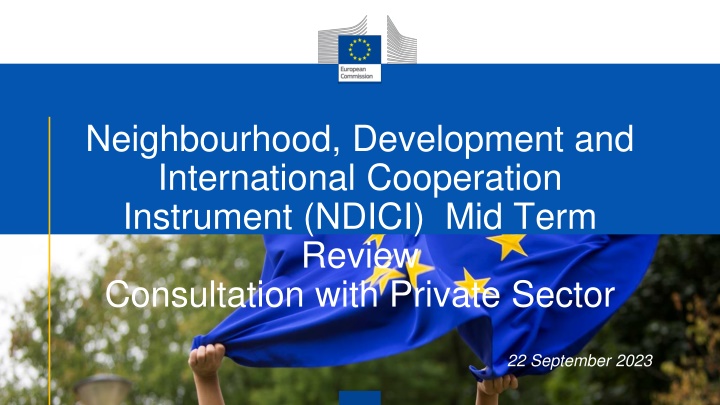
Neighbourhood Development and International Cooperation Instrument (NDICI) Mid-Term Review Consultation with Private Sector
This consultation focuses on reviewing the progress and policies of the NDICI Mid-Term Review, including an overview of regional indicative programs and priority areas for Sub-Saharan Africa. The agenda covers key thematic priorities such as prosperity, sustainable growth, migration, and support measures. The State of Play for 2021-2024 highlights committed actions and budget allocations.
Download Presentation

Please find below an Image/Link to download the presentation.
The content on the website is provided AS IS for your information and personal use only. It may not be sold, licensed, or shared on other websites without obtaining consent from the author. If you encounter any issues during the download, it is possible that the publisher has removed the file from their server.
You are allowed to download the files provided on this website for personal or commercial use, subject to the condition that they are used lawfully. All files are the property of their respective owners.
The content on the website is provided AS IS for your information and personal use only. It may not be sold, licensed, or shared on other websites without obtaining consent from the author.
E N D
Presentation Transcript
Neighbourhood, Development and International Cooperation Instrument (NDICI) Mid Term Review Consultation with Private Sector 22 September 2023
AGENDA 1. - Opening and introduction to the Mid Term Review of NDICI 2. - Overview of the Regional Multiannual Indicative Programmes by geographical region: Objectives, progress to date and policy context - Overview of Prosperity thematic priority under the Global Challenge of Multiannual Indicative Programmes: Objectives, progress to date and policy context
1. Opening and Introduction to the MTR of NDICI
MTR context The Multi-annual Indicative Programmes (MIPs) cover the 7 years of the MFF (2021-2027) NDICI-Global Europe provides that MIPs shall be reviewed at mid-term, following the mid-term evaluation of the instrument (MTR) New geopolitical and geo-economic environment (Covid, RU s war of aggression against UA ) New policy framework: Global Gateway, Team Europe approach
2. Overview of the Regional MIPs by geographical region
6 Priority Areas - SSA Regional MIP Total RIP EUR 10,242 bn Democratic Governance and Peace Governance, elections, etc.; Peace and Security, transnational threats, maritime security. Culture. Green transition Human Development Geographic distribution Climate Change, renewable energy and regional interconnectivity; agri-food systems; biodiversity, environment and wildlife management; water basins management, oceans (incl blue economy). 2 100 M EUR Health Education & Skills 40% WA 39% ECA 21% SA 880 M EUR 855 M EUR Sustainable Growth and Decent Jobs Regional economic integration, trade & trade facilitation; strategic corridors (transport infrastructure road, rail, ports); sustainable finance, investment climate and private sector. 1 830 M EUR Migration and forced displacement Digital, Science, Technology & Innovation Digital transformation and digital connectivity Science, Technology and Innovation Return and readmission, migration management and legal migration; forced displacement; border management 1 240 M EUR 1 600 M EUR SUPPORT MEASURES 287 M EUR EFSD+ 1 450 M EUR
MIP State of play 2021-24 (committed & planned to be committed Actions) 112 Actions for an amount of EUR 6 614.05 M BUDGET REPARTITION PER AREA Sustainable Growth and Decent Jobs 17% Digital, Science, Technology and Innovation 10% Green Transition 18% Migration and forced displacement 18% Support Measures 2% Democracy, Governance, Peace 8% Human Development 9% EFSD+ 18%
AMERICAS and the CARIBBEAN
Regional MIP (EUR 1280 mln) Caribbean window (EUR 208 mln) Central America (EUR 50 mln) US and Canada (EUR 55 mln) Support measures (EUR 126 mln)
Regional Multi-annual Indicative Programme for Asia and the Pacific ( 2.3 billion) ASIA Priority Area 1: Regional Integration & Cooperation 721 million Priority Area 2: Pursuing EU interests with key partners 355 million Priority Area 3: Migration, forced displacement & mobility 422 million China India Gulf Countries, High Income Countries and other Key Partners, incl. public diplomacy with China and India (FPI) Forced displacement Migration management Flexible instrument migration Central Asia South Asia South-East Asia and ASEAN Pacific Pan-Asia Support to investments under EFSD+ 802 million Support Measures 64 million Guarantees (incl. up to 10% for Technical Assistance) Blending External Lending Mandate Legacy *Not included: Contributions to Erasmus+ (EUR 370 million) and to transregional thematic knowledge hubs/technical assistance facilities (EUR 78 million)
Engagement with private sector under the Regional Asia-Pac MIP Across the regional programme: Several "Team Europe" initiatives delivering on Global Gateway priorities: "EU - Central Asia Digital Connectivity", "Water-Energy-Climate Change in Central Asia", "Green TEI in Partnership with ASEAN/South-East Asia, "ASEAN Sustainable Connectivity", "Green Blue Alliance for the Pacific" SWITCH Asia supporting Sustainable Consumption and Production (SCP) and the transition of the region to a low-carbon, resource-efficient and circular economy -> seek to facilitate trade & investment and require to work closely with the private sector for implementation Under achieve transformative impact: De-risking private sector operations Providing direct opportunities to private sector under the Asia-Pacific Investment Facility (APIF), eg. the Kuali Fund which will provide green finance to Indian SMEs. -> Strong interest for energy infrastructures, greening of industrial processes, railways transport (mainly in Central Asia) EFSD+, 2 modalities to mobilise SDG-related investments to
Regional Southern Neighbourhood MIP - Implementing the 2021 Agenda for the Mediterranean Strengthen resilience, build prosperity & seize the digital transition Human development, good governance & the rule of law Regional integration Peace and Security Green transition: climate resilience, energy, and environment
For a green, digital and just recovery The 5 thematic priorities of the MIP have proven comprehensive and flexible to accommodate needs and respond to regional challenges Role of regional cooperation: innovative and pilot nature, to be rolled out at country level Using the full toolbox, including blendings and guarantees under EFSD+ Regional Team Europe on Jobs through Trade and Investment, close cooperation with EU and MS agencies for a transformative impact.
Main areas of focus relevant to the private sector Under resilience, build prosperity and seize the digital transition Priority 2: Strengthen Under Transition Priority 4 : Green Cooperation towards clean and secure energy Strengthen entrepreneurship innovation and digitalisation (MEDUSA) economic governance through and research, Joint mitigation, resilience Climate Action: adaptation climate and Facilitate through trade, sustainable investment and connectivity regional economic integration Biodiversity and natural resource protection Promote green and circular economy Enhance inclusive economy and financial inclusion
Regional Eastern Neighbourhood MIP - Implementing the Post-2020 Eastern Partnership priorities 1. Resilient, sustainable and integrated economies 2. Building accountable institutions, the rule of law and security, 4. Support digital transformation 5. Support fair and inclusive societies 3. Strengthen environmental and climate resilience
Staying the course of supporting resilient economies and the green and digital transitions in spite of regional turbulences The 5 thematic priorities of the MIP have proven comprehensive and flexible to respond to regional turbulences. Role of regional cooperation: support the Economic and Investment Plan for the Eastern Partenrship; offer harmonised support across the region on themes/policies of common interest or of a regional nature (environment, climate change, energy, transport); support regulatory alignment (energy, transport, digital). Using the full toolbox, including blending and guarantees under EFSD+ Regional Team Europe on water and net-zero transition, close cooperation with EU and MS agencies for a transformative impact.
Main areas of focus relevant to the private sector Under Priority 4: Resilient economies Under Priority 3 : Green Transition Supporting a better business climate across the region; Support B2B contacts between the EaP and the EU; Support a better understanding of trade opportunities in the EaP region through the EaP Trade Helpdesk Support the greening processes (acquisition of EE equipment, etc.) Enhance inclusive economy and financial inclusion Supporting investments in the field of waste management Supporting investments in renewable energy through guarantee instrument electricity cable, upgrading of transmission networks, etc.) Supporting investments mobility Supporting the greening of businesses Joint Climate Action: climate mitigation, adaptation and resilience Biodiversity and protection our blending (Black in and Sea HPP Georgia, of production in clean natural resource
Main areas of focus relevant to the private sector Under transformation Priority 4: digital Investing in broadband connectivity (Black Sea digital cable, rural broadband connectivity) Supporting integration in EU Digital Single Market Supporting innovation ecosystems Supporting cyber resilience. Supporting e-governance (digitalisation of public services and businesses).
Discussion Guiding questions: In this view, do the NDICI geographical priorities and objectives remain relevant to address current challenges? What specific challenges, in particular emerging ones, should the programmes address in priority?
3. Overview of "Prosperity" thematic MIP under the Global Challenge
Global Challenges Global Challenges is one of the 4 thematic programmes under NDICI-GE Focuses on global action to tackle global challenges with a wide scope of intervention areas: People, Planet, Prosperity, Partnerships Supports EU s ambition as a stronger global actor and a champion of multilateralism In line with NDICI approach/philosophy: geographisation, subsidiarity, complementarity EUR 3.6bn allocated; Aligned with EU policies, notably Global Gateway Strategy and the Green Deal, directly or indirectly contributing to their goals
Global Challenges strategic areas Planet Partnerships People Prosperity (Human Development) (part of Green Deal) Multilateralism, inequalities, gender, sustainability
Prosperity To support sustainable and inclusive economic recovery and growth, climate-neutral and sustainable economic development and progress in human development
Prosperity priorities Investment climate, private sector, decent work, employment and trade: Promote sustainable and inclusive growth and creation of decent jobs and supporting labour rights for men and women, fight against inequalities, enhancing sustainable and inclusive investment climate, and the development of a socially and ecologically responsible private sector. Circular economy: Global transformative action to promote sustainable consumption and production, a circular economy and foster sustainable development while decoupling economic development from the unsustainable use of natural resources. Quality infrastructure and Connectivity: support global efforts to promote quality infrastructure investments, regional integration and connectivity in the context of the transition to inclusive, climate-neutral, resilient and sustainable economies; guide the implementation of the Global Gateway strategy. Global action to eradicate child labour: Contribute to the fight against inequalities and forced labour Digital transformation: Support global efforts to promote digital transformation with appropriate digital and data technologies in view of the transition to inclusive, climate-neutral, resilient, and sustainable economies. Sustainable agri-food systems: Support global efforts to promote the transition to inclusive, climate- neutral, resilient, and sustainable agri-food systems, with a particular focus on sustainable agriculture, nutrition and food security.
Prosperity progress to date Investment climate, private sector, decent work, employment and trade: Promoting a conducive investment climate to attract sustainable investments and gaining better access to finance, especially for women and youth, to facilitate and strengthen the impact of Global Gateway flagships initiatives; providing accompanying measures for public and private entities in EU partner countries to adhere to (forthcoming) EU legislation that promotes Corporate Sustainability Due Diligence compliance and thus supports international human rights, labour and environmental standards; improving the transparency, traceability and responsibility in value chains (textile, extractive industries, raw materials). Circular economy: Enhancing multilateral action (through the UN Partnership on Green Economy -PAGE), and knowledge on circular economy (through the Green Growth Knowledge Platform -GGKP) and civil society's voice (through the Green Economy Coaltion) to accelerate the global transition to green and circular economy. Proposing an innovative mechanism (EU Resource Center) to mobilize EU know how on circular economy in support of partners needs. Quality infrastructure and Connectivity: Supporting the application of the G20 principles for quality infrastructure through the Global Gateway Support Mechanism (GGSM); promoting transport connectivity and Road safety through the UN Road Safety Fund; supporting the development of well-prepared infrastructure projects in order to reduce the investment gap through SOURCE. Global action to eradicate child labour: Addressing child labour, focusing on the coffee sector, combining a value chain and area based approach and addressing economic drivers as well as other factors as education.
Prosperity progress to date (II) Digital transformation: Quality infrastructure and connectivity agenda (digital infrastructure), while ensuring quality infrastructure investment principles The promotion of EU values-based human-centric and gender responsive digital transformation, as well as green digital transformation, by engaging on processes and policy-making of standardization Support the twin transition in link to D4D Hub TEI Sustainable agri-food systems: Enhancing knowledge generation, dissemination and uptake, as well as innovative agroecological and sustainable food system policies and practices, through Global research & innovation and advisory services Strengthening global governance of food systems and promoting evidence-based policy making (data and information systems, FAO and EU research centres), strengthening nutrition governance and international initiatives; strengthening global food security governance and data. Improving land governance and tenure systems (VGGTs), Securing Sustainable Small-Scale Fisheries and promoting the principles for Responsible Investment in Agriculture (RAI) and transparency and equality in land and ocean governance
Global Challenges Mid-term Review We are currently facing precarious disruptions in the multilateral order, which is directly affecting the issues at the centre of the GC programme. This GC thematic programme has the specific objective to provide for an extra layer to address global challenges at global level: In this view, are the GC thematic programme priorities and objectives still relevant to address current challenges? What specific challenges, in particular emerging ones, should the programme address in priority? MTR will assess and put a special focus on the contribution of GC to multilateralism, reduction of inequalities and migration
Discussion Guiding questions: In this view, do the NDICI GC thematic programme priorities and objectives remain relevant to address current challenges? What specific challenges, in particular emerging ones, should the programme address in priority?

